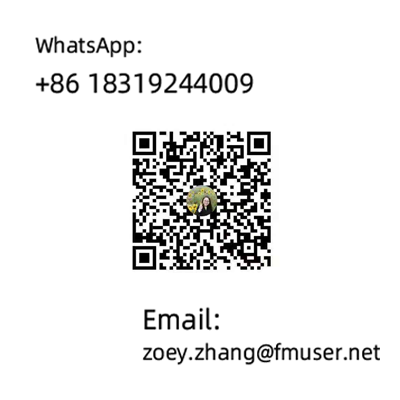Products Category
- FM Transmitter
- 0-50w 50w-1000w 2kw-10kw 10kw+
- TV Transmitter
- 0-50w 50-1kw 2kw-10kw
- FM Antenna
- TV Antenna
- Antenna Accessory
- Cable Connector Power Splitter Dummy Load
- RF Transistor
- Power Supply
- Audio Equipments
- DTV Front End Equipment
- Link System
- STL system Microwave Link system
- FM Radio
- Power Meter
- Other Products
- Special for Coronavirus
Products Tags
Fmuser Sites
- es.fmuser.net
- it.fmuser.net
- fr.fmuser.net
- de.fmuser.net
- af.fmuser.net ->Afrikaans
- sq.fmuser.net ->Albanian
- ar.fmuser.net ->Arabic
- hy.fmuser.net ->Armenian
- az.fmuser.net ->Azerbaijani
- eu.fmuser.net ->Basque
- be.fmuser.net ->Belarusian
- bg.fmuser.net ->Bulgarian
- ca.fmuser.net ->Catalan
- zh-CN.fmuser.net ->Chinese (Simplified)
- zh-TW.fmuser.net ->Chinese (Traditional)
- hr.fmuser.net ->Croatian
- cs.fmuser.net ->Czech
- da.fmuser.net ->Danish
- nl.fmuser.net ->Dutch
- et.fmuser.net ->Estonian
- tl.fmuser.net ->Filipino
- fi.fmuser.net ->Finnish
- fr.fmuser.net ->French
- gl.fmuser.net ->Galician
- ka.fmuser.net ->Georgian
- de.fmuser.net ->German
- el.fmuser.net ->Greek
- ht.fmuser.net ->Haitian Creole
- iw.fmuser.net ->Hebrew
- hi.fmuser.net ->Hindi
- hu.fmuser.net ->Hungarian
- is.fmuser.net ->Icelandic
- id.fmuser.net ->Indonesian
- ga.fmuser.net ->Irish
- it.fmuser.net ->Italian
- ja.fmuser.net ->Japanese
- ko.fmuser.net ->Korean
- lv.fmuser.net ->Latvian
- lt.fmuser.net ->Lithuanian
- mk.fmuser.net ->Macedonian
- ms.fmuser.net ->Malay
- mt.fmuser.net ->Maltese
- no.fmuser.net ->Norwegian
- fa.fmuser.net ->Persian
- pl.fmuser.net ->Polish
- pt.fmuser.net ->Portuguese
- ro.fmuser.net ->Romanian
- ru.fmuser.net ->Russian
- sr.fmuser.net ->Serbian
- sk.fmuser.net ->Slovak
- sl.fmuser.net ->Slovenian
- es.fmuser.net ->Spanish
- sw.fmuser.net ->Swahili
- sv.fmuser.net ->Swedish
- th.fmuser.net ->Thai
- tr.fmuser.net ->Turkish
- uk.fmuser.net ->Ukrainian
- ur.fmuser.net ->Urdu
- vi.fmuser.net ->Vietnamese
- cy.fmuser.net ->Welsh
- yi.fmuser.net ->Yiddish
Is low power broadcasting legal
Date:2015/11/12 12:01:55 Hits:
This depends on what country you are in. The situation varies from place to place, so you should check with a lawyer or with the agency that regulates broadcasting in your part of the world before turning on any transmitter. Don't rely entirely on web pages or usenet newsgroups for such critical information.In some European countries (e.g. the Netherlands), you can be arrested for merely possessing an unlicensed transmitter. In Ireland, unlicensed broadcasting is unlawful but stations that don't cause interference are seldom prosecuted. In Taiwan, the authorities have recently threatened to imprison unlicensed broadcasters. Indonesia generally tolerates unlicensed broadcasts on shortwave. Canada and Japan have made it possible for people to get licenses for very low power FM stations if the licensees promise to provide programming that is not available from mainstream outlets.
In the United States, Title 47 of the Code of Federal Regulations (Part 15, subpart C) indicates that unlicensed broadcasting is limited to microscopic power levels. The power limit for unlicensed FM transmissions is a signal strength of 250 microvolts per meter, measured 3 meters from the transmitting antenna. At this power level, stereo reception with a good signal to noise ratio is only possible within a 100 foot radius, and an average car radio can barely detect the signal at a distance of 100 meters. On the AM band, the limit is 0.1 watt and an antenna system no more than 3 meters long; this provides a range of 2 or 3 city blocks for cheap receivers, farther for high-quality radios.
Some have argued that the strictness of these regulations violates the US Constitution (footnote 1) and the UN Declaration of Human Rights.(footnote 2) Others have said that the federal government does not (or should not) have jurisdiction over low-power transmissions that do not cross state lines. There have been many court battles over the FCC's regulations, and no doubt there will be many more.
Apart from the Part 15 rules mentioned above, legal unlicensed options include carrier current transmission (using the power lines as an antenna system); cable FM broadcasting (working in conjunction with your local cable TV system); and burying special "leaky" coaxial cable to use as an AM transmitting antenna on privately owned land. Panaxis and LPB can provide more information about legal options.
footnotes
1. From the Bill of Rights: "Congress shall make no law respecting an establishment of religion, or prohibiting the free exercise thereof; or abridging the freedom of speech, or of the press..."
2. Article 19: "Everyone has the right to freedom of opinion and expression; this right includes freedom to hold opinions without interference and to seek, receive and impart information and ideas through any media and regardless of frontiers."
Leave a message
Message List
Comments Loading...





